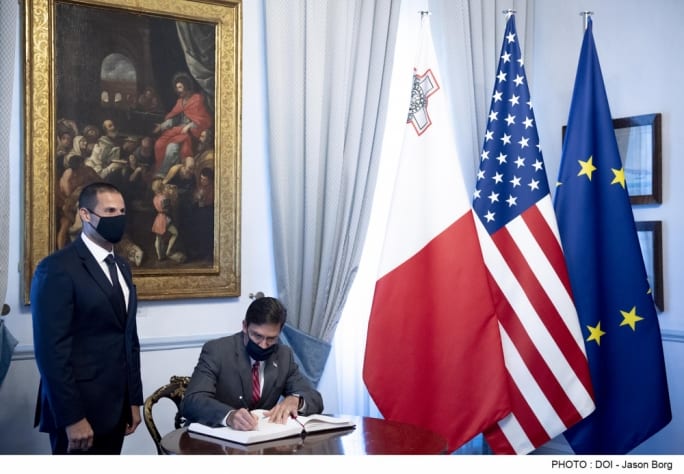
Times of Malta yesterday reported there likely will be no SOFA agreement because the Americans are not buying “the diet version”. I can only imagine Robert Abela’s government treating the Pentagon and the State Department the way it treats its own citizens. Unable to say no, it will then try cheap prestidigitation to make its audience believe, wrongly, it’s getting what it wants.
Apparently the Maltese government told the Americans it would surrender jurisdiction over American uniformed men and women, except that it wouldn’t. A bit like the gift of l-aqwa żmien, you think you’ll have it. But you won’t really.
Rumour has it that when Evarist Bartolo’s magic formula for pleasing the Americans without annoying the Labour Party’s traditional support base was presented to the visiting defence secretary Mark Esper, the American’s reaction to Robert Abela was “are you fucking kidding me?” The quote has not been independently confirmed so we’ll take it down as apocrypha for now. Fascinating, though, how the Labour Party continues to fully expect the world to fall for its parlour tricks like Super One’s audience on any given Sunday.
It is not just Labour’s support base that Robert Abela needed to worry about. Someone inside the government must be vaguely familiar with Malta’s obligations under the Rome statute of the International Criminal Court (ICC).
The ICC laws have been in force in Malta since 2003, before we joined the EU. Under those laws the ICC in the Hague has the power to demand that a Maltese court surrenders a person suspected of committing serious international crime such as war crimes over to its custody. That’s even before actual charges at the ICC have been filed.
Let’s take this hypothetical scenario. An American officer who worked at Abu Ghraib prison in Iraq say, or in Guantanamo, or on some rendition mission anywhere on the planet, is stationed on Malta on some US mission. The ICC demands from a Maltese court the surrender of the officer wanted for war crimes or something of the sort.
Under existing laws, the Maltese court is obliged to oversee the detention of that officer and their surrender to the custody of the ICC.
But if we were to have a SOFA agreement – a meaningful one, not some airy fairy ‘compromise’ that exists only in the fantasy thinking of Robert Abela and some hopelessly optimistic vets – the Maltese courts would be inhibited by the immunity enjoyed by US officers here in Malta.
It would not be the first contradiction in our laws, our courts would be coming up against. But in political terms this would be a choice.
The ICC statute secured in the 1990s was a triumph of multilateralism. It took international law to another level, where wrongful conduct of individuals (even heads of governments and states) would still be subjected to due process and possible punishment independently of what the country they come from thinks about it.
Understand this. Before the ICC international law regulated countries and their conduct and their relationship with each other. Individuals were the exclusive remit of domestic law. The ICC changed that.
People have been punished by international courts before but those were courts set up by victors in a war to try the losers. The Nuremberg trials were a mark of civilisation in that they forced war criminals to answer to their crimes and face punishment on the back of evidence brought against them in a fair trial. But no war criminals fighting for the winners of the war were tried and that is unjust in and of itself.
The ICC is not perfect, not least because its statute is not universally applicable. It cannot work in countries who have not signed up to the ICC.
The United States quit the ICC. It conducts its international relations unilaterally because its might and clout are more effective when it is dealing with countries on a bilateral basis rather than around a regional or global forum. When the Pentagon’s chief looks at you from on top of the rim of his glasses and asks ‘are you fucking kidding me?’ over tea for two, the feeling is likely to be different than a debate at the UN General Assembly.
Choosing appeasement to the juggernaut of American in exchange for the rewards and trinkets “to our economy” over imperfect multilateralism may have its “advantages”. Perhaps those advantages are exacerbated by our minuteness. It’s often understandable that we suck up to the big boys.
But unilateralism is by definition self-centred. In times of need the big boys will step up to our aid when their domestic interests are better served by such a move.
Perhaps, in the long term, it behoves us to uphold the rule of international law.